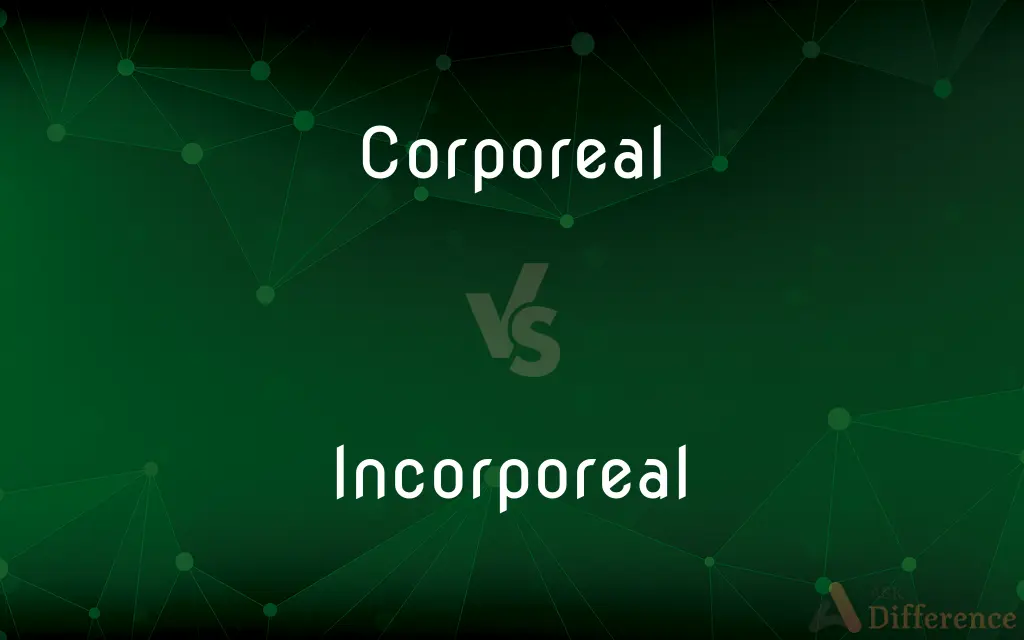Corporeal vs. Incorporeal — What's the Difference?
Edited by Tayyaba Rehman — By Urooj Arif — Updated on March 26, 2024
Corporeal pertains to physical, tangible objects or bodies, while incorporeal refers to things that lack physical existence, such as ideas or spirits.

Difference Between Corporeal and Incorporeal
Table of Contents
ADVERTISEMENT
Key Differences
Corporeal entities are characterized by their material existence; they can be seen, touched, and interacted with physically. This term often relates to the human body, physical objects, and the material world. Incorporeal, on the other hand, denotes entities that do not possess a physical form. This concept applies to things like rights, intellectual property, and spiritual beings, which exist but are not tangible.
While corporeal aspects are grounded in the physical realm and subject to physical laws, incorporeal aspects reside in the intellectual, legal, or spiritual domains. This distinction highlights how corporeal matters engage with the senses, whereas incorporeal matters engage with the mind or spirit.
In legal contexts, corporeal property refers to physical assets like land or buildings, subject to ownership and transfer. Conversely, incorporeal property includes rights or interests that have value and can be owned but do not have a physical form, such as copyrights or leases.
The significance of distinguishing between corporeal and incorporeal becomes evident in philosophical, religious, and legal discussions. It allows for the exploration of how humans interact with and conceptualize the material world in contrast to the realm of ideas, rights, and spirituality.
While corporeal concerns the tangible aspects of existence, bringing the material world into focus, incorporeal shifts the perspective towards the non-physical, highlighting the importance of ideas, rights, and spiritual entities in human experience.
ADVERTISEMENT
Comparison Chart
Definition
Pertaining to material, physical existence
Relating to non-material, non-physical existence
Examples
Human bodies, objects, land
Rights, spirits, ideas
Domain
Physical realm
Intellectual, spiritual, legal realms
Interaction
Can be seen, touched, interacted with
Cannot be physically interacted with, but can be understood or owned
Legal Context
Physical assets like real estate
Non-physical assets like copyrights, leases
Compare with Definitions
Corporeal
Pertaining to things that can be seen or touched.
The museum's collection includes corporeal artifacts from ancient times.
Incorporeal
Concerning legal rights without physical presence.
The tenant holds an incorporeal right to occupy the land.
Corporeal
Involving the human body.
Dancing is an expression of corporeal artistry.
Incorporeal
Not composed of physical matter.
Ghost stories often involve incorporeal beings.
Corporeal
Relating to a physical, tangible body.
The sculpture gave a corporeal form to the artist's vision.
Incorporeal
Pertaining to non-material aspects like rights or ideas.
Copyrights protect the incorporeal creations of an author.
Corporeal
Material or physical in nature.
The earthquake caused corporeal damage to the buildings.
Incorporeal
Relating to the spiritual rather than the physical.
Many religions believe in incorporeal souls.
Corporeal
Concerning physical objects or substances.
Scientists study the corporeal properties of materials.
Incorporeal
Intellectual or abstract in nature.
The theory explores the incorporeal nature of beauty.
Corporeal
Relating to a person's body, especially as opposed to their spirit
He was frank about his corporeal appetites
Incorporeal
Lacking material form or substance.
Corporeal
Of, relating to, or characteristic of the body.
Incorporeal
(Law) Of or relating to property or an asset that cannot be physically possessed, as a right or patent.
Corporeal
Existing or manifesting in bodily form.
Incorporeal
Having no material form or physical substance.
Corporeal
Of a material nature; tangible
Corporeal property.
Incorporeal
(legal) Relating to an asset that does not have a material form; such as a patent.
Corporeal
Material; tangible; physical.
Incorporeal
Not corporeal; not having a material body or form; not consisting of matter; immaterial.
Thus incorporeal spirits to smaller formsReduced their shapes immense.
Sense and perception must necessarily proceed from some incorporeal substance within us.
Corporeal
(archaic) Pertaining to the body; bodily; corporal.
Incorporeal
Existing only in contemplation of law; not capable of actual visible seizin or possession; not being an object of sense; intangible; - opposed to corporeal.
Corporeal
Having a body; consisting of, or pertaining to, a material body or substance; material; - opposed to spiritual or immaterial.
His omnipotenceThat to corporeal substance could addSpeed almost spiritual.
Incorporeal
Without material form or substance;
An incorporeal spirit
Corporeal
Having material or physical form or substance;
That which is created is of necessity corporeal and visible and tangible
Corporeal
Affecting or characteristic of the body as opposed to the mind or spirit;
Bodily needs
A corporal defect
Corporeal suffering
A somatic symptom or somatic illness
Common Curiosities
What does corporeal mean?
Corporeal refers to things that have a physical, material existence, such as objects, bodies, and substances that can be seen and touched.
What is an example of something incorporeal?
An example of something incorporeal is a copyright, which is a legal right granting protection to the creators of original works, without a physical form.
Can a concept be both corporeal and incorporeal?
A concept can have both corporeal and incorporeal aspects; for example, a book is corporeal as a physical object, but the ideas and stories it contains are incorporeal.
What role do incorporeal rights play in the economy?
Incorporeal rights, like intellectual property rights, play a crucial role in the economy by encouraging innovation and creativity, providing legal protection for creators, and contributing to economic growth.
Why is the distinction between corporeal and incorporeal important?
The distinction is important because it affects how we interact with, protect, and value different entities, influencing legal, philosophical, and spiritual understanding and practices.
How do corporeal and incorporeal differ in legal terms?
In legal terms, corporeal refers to tangible property like land or buildings, while incorporeal refers to intangible property like rights, patents, or leases.
How do religions typically view incorporeal entities?
Religions often view incorporeal entities, such as souls or spirits, as essential aspects of belief systems, focusing on their spiritual significance and impact on the material world.
How does the concept of incorporeal differ across cultures?
The concept of incorporeal varies across cultures, especially in how spiritual entities are understood and revered, reflecting diverse beliefs about the soul, afterlife, and non-material aspects of existence.
Can incorporeal entities have legal protection?
Yes, incorporeal entities, such as intellectual property or contractual rights, can have legal protection, safeguarding the interests and ownership of non-tangible assets.
What challenges arise in valuing incorporeal property?
Valuing incorporeal property poses challenges due to its intangible nature, requiring methods to assess its economic impact, potential earnings, and significance, often leading to complex legal and financial analyses.
Share Your Discovery

Previous Comparison
Scampi vs. Alfredo
Next Comparison
Hubby vs. HusbandAuthor Spotlight
Written by
Urooj ArifUrooj is a skilled content writer at Ask Difference, known for her exceptional ability to simplify complex topics into engaging and informative content. With a passion for research and a flair for clear, concise writing, she consistently delivers articles that resonate with our diverse audience.
Edited by
Tayyaba RehmanTayyaba Rehman is a distinguished writer, currently serving as a primary contributor to askdifference.com. As a researcher in semantics and etymology, Tayyaba's passion for the complexity of languages and their distinctions has found a perfect home on the platform. Tayyaba delves into the intricacies of language, distinguishing between commonly confused words and phrases, thereby providing clarity for readers worldwide.














































